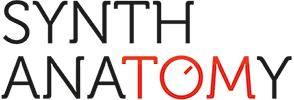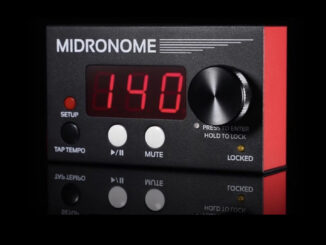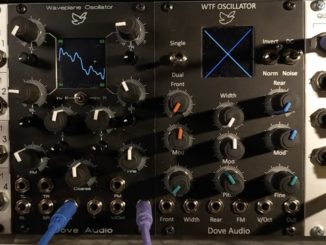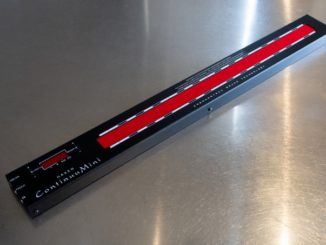Aodyo Instruments Loom is a new portable multidimensional MPE controller made for touching, sliding, strumming, and triggering signals, now on Kickstarter.
In November 2022, the French company Aodyo Instruments launched the Kickstarter campaign for the Anyma Omega, the big version of its Anyma Phi physical modeling Synthesizer. The release has been delayed several times in the last few months due to unplanned component changes, including a new screen, which led to a redesigned mainboard.
During this difficult time, the developers didn’t keep their fingers crossed but continued working on the synth and a new project called Loom. The latter is a new MPE controller and an element that will be part of the Anyma Omega. Today, they started a Kickstarter, which they also want to offer as a standalone version.
Aodyo Instruments Loom
Loom is a multidimensional MPE MIDI controller built for immediate playability and expressiveness. Its elongated form factor is reminiscent of the Haken ContinuuMini but uses a different surface.
On the Anyma Omega Desktop, the Loom will be installed on the bottom of the case, while the keyboard has it above the polyphonic aftertouch keys.
The standalone version of the Loom uses the same technology and will be available in two versions: 2 octaves and 3 octaves. They use a multidimensional multi-touch surface with independent control of pitch (x), timbre (y), and dynamics (z) for each finger.
According to the developers, it also provides unique sensors that complement the main surface, including thumb-activated tactile sliders and bars on the front and back edge and a pressure-sensitive action zone on the left.
Playing Modes
A key feature of the Loom is its different play modes, which enable you to explore it in different fascinating ways. Keyboard lets you play it like a traditional keyboard.
Things get more special in the ribbon mode, where you can glide over the surface. You can use it to glide from notes to other notes, giving you a Theremin-like sound experience. Alternatively, you can map it to MIDI CC data and modulate parameters. A feature we know and love from the Hydrasynth ribbon controller.
Do you prefer to play your synths like a guitar? No problem! Activate the strum mode and experience guitar strumming with your favorite sounds. Another interesting mode is the drum mode, which turns Loom into a drum trigger controller.
And there are more. Ayodo Instruments promises more playing modes via future software updates. Thanks to its USB-C port and MIDI TRS output socket, you can play and control your hardware and software with it.
First Impression
As an early adopter and supporter of the Anyma Omega keyboard, I would, of course, be more happy to hear the sentence: your unit is ready and shipped. However, there were delays and events that no developer would want to experience. I understand the situation where they are currently in.
Nevertheless, I find the Loom an exciting MIDI MPE controller. It looks very handy and beautiful, and I’m excited to experience it on my Omega synth. It’s a shame that it doesn’t have analog outs like CV or gate.
You can support the new Aodyo Instruments Loom project via the Kickstarter campaign until April 11, 2024. The super early bird price for the first 100 units is 239€ for the Loom 2-octave and 339€ for the 3-octave version. The early adopter price is 259€ and 369€, respectively.
According to Aodyo, the units will have an estimated retail price of 400€ and 570€. Deliveries are expected in Summer 2024.
More information here: Aodyo Instruments / Kickstarter






cool! i want Omega though. thank you for the Phi updates!
Ditto – I want the Omega also…
This lost me at MPE MIDI (which is the only MIDI it supports). I saw the vid pop in feed and thought – or pretty cool. Then the MPE mention. As someone that tries to keep a computer out of my (live-focused) set-up, that was a turn off.
mpe is not only for daws. use your computer to read more
We have many demos with non-MPE virtual instruments and hardware synths, it works great with all kinds of MIDI devices. The next demo we’ll show is how it works with a modular synth setup.